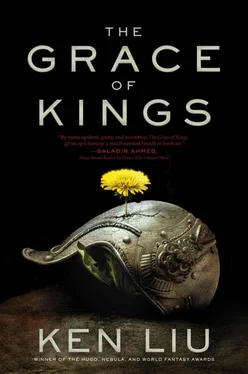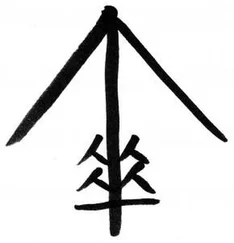She would stumble through the fog, trusting that no wall would suddenly loom before her.

“Tell me about Lady Risana,” Jia said to Rona, Risana’s maid.
Jia had cornered the fourteen-year-old girl in the kitchen, where she was trying to prepare a tray of snacks to take up to Risana’s room.
“The mistress is very kind,” the girl said.
“But how is she with the king? What do they do together?”
The girl blushed.
“No, no. I’m not asking for bedroom gossip, silly girl. I mean what do they talk about?”
“Lady Jia, I don’t know much. When they are together, she usually sends me away.”
Well, one thing is for sure, Risana knows how to instill loyalty in her servants. But Jia had other tricks.
“I hear rumors that King Kuni never laughs when Lady Risana is around,” Jia said.
“That’s not true!” The girl’s tone was indignant. “I hear the king play the coconut lute sometimes after dinner, and the mistress sings. She has a beautiful voice, and sometimes if it’s a funny song she laughs, and I hear the king laugh even louder. Other times she sings sad songs, and she cries, and I hear the king cry with her.”
“Is it true that Lady Risana is not much of a dancer?”
“Oh no, not at all. She will put on a dress with very long sleeves and loosen her hair. Then she twirls and bends at the waist and leaps into the air, her back arched like a bow. Her sleeves and hair will float and trace out long arcs in the air, like three rainbows in the sky, like the three rivers meandering across the Big Island, like three strands of silk in the wind—”
Jia dismissed her.

In the dark, Jia twisted and turned. Kuni was asleep next to her, snoring loudly as was his wont. She had forgotten about this habit of his. Otho Krin was a quiet sleeper.
She imagined Kuni and Risana together, and despite herself, she was consumed with fury. When they were first married, Kuni and she had shared an easy, joking rapport. But she wasn’t much of a singer, and she didn’t remember him ever laughing or crying with her the way the maid described him doing with Risana. She did not dance, could never have danced, like Risana. Suddenly she felt the ghost of her vanished youth. Gone was the redheaded girl who had once inspired the future king with a dandelion.
Visions came to her: Risana losing her unborn child; Risana unable to conceive; Risana surrendering the favor of the king. She knew how to make those visions come true: when she had worked out how to cure her own barrenness, she had studied certain herbal recipes that had the opposite effect. As was so often the case in nature, substances tending to opposite effects were bound together; a thin line divided poison from medicine.
She shuddered, revolted and disgusted with herself. It was but a passing moment of weakness, she hoped. No matter how desperate she got, she would never cross that line, for to do so was to give herself up to the maelstrom, to lose herself.
She got up, went to her dresser, and took out the bundle of letters that Kuni had sent her over the years. Without turning on any light, she leafed through them, her fingers tracing the blank surface, remembering the patterns of invisible ink. No matter how busy he was, Kuni always found time to write.
Jia wiped away her tears. She was the mother of Kuni’s eldest son, the future crown prince. She would always be his first love, the one who had thrown her lot in with him before he was anybody, the one who believed that he was destined for greatness. She could not really blame him, seeing as she was the one who had told him to take another wife. She had done so to ensure his success, and it was a sacrifice that she would not betray.
Maybe Soto was right. It was silly to make a fetish out of love, and not to accept that love was like food, and each dish had its own flavor. The heart surely had room for more than one.
But she would ask Kuni to name their son, now that Toto- tika was four, the age of reason. It was time to secure her place and to prepare for the palace rivalries that were sure to come.

“How about Timu?” said Kuni.
“‘The Gentle Ruler’?” said Jia, translating from Classical Ano. She pondered the name. It was regal and proper, of course, being an allusion to Kon Fiji’s poem:
The gentle ruler governs without seeming to govern.
But she had hoped for something a little more distinctive, something that referenced the boy’s wily father and fierce mother. She was about to protest when she remembered the next line in the poem:
He honors his subjects as he honors his own mother.
Jia smiled. What better way was there for Kuni to express how he really felt? “It’s perfect,” she said. “From now on, Toto- tika will be known as Prince Timu.”
“We might as well name our daughter, too,” said Kuni, smiling. “She’s a little young, but I think she’s brighter than her brother and plenty reasonable now. How about Théra, meaning ‘Dissolver of Sorrows’? Though we know her life, like ours, may be full of joy and sorrow, rise and fall, yet perhaps she can dissolve the sad parts and keep on laughing, as her parents have always tried to do.”
“Of course,” said Jia. “Princess Théra it is.”
And her heart was indeed glad.

Mata arrived back on the Big Island to news that his realm was on the edge of collapse. Puma Yemu was making it impossible to safely transport grain anywhere in Cocru. Kuni had settled in Zudi, and rumors flew that he was planning to sweep down to Çaruza any minute. Stories of Marshal Mazoti’s victories spooked Mata’s men, who believed that she could conjure soldiers from the sky.
Mata did not despair. In fact, he welcomed the news. Ever since the fall of the empire, life had seemed dull to him, to have lost some of its flavor. Mocri was a good opponent, but he did not think big enough. Kuni Garu, on the other hand, was an enemy worthy of his full attention.
The more desperate the situation, the calmer he felt. He would defeat Kuni the way he defeated all his enemies, through strength and honor.
He asked for five thousand of his best riders and requisitioned fifteen thousand horses.

When Marshal Mazoti went north to deal with Rima, she left behind the bulk of the Dasu army at Zudi. Fifty thousand men and tens of thousands of horses, too many to garrison in the city, camped on the Porin Plains. This was a larger army even than the combined forces of Tanno Namen and Kindo Marana at Wolf’s Paw. Cogo Yelu, always meticulous and careful, kept the provisions smoothly flowing.
At noon, scouting airships arrived at Zudi with the news that Mata Zyndu and five thousand warriors were riding toward Zudi and would arrive by the afternoon. The main part of Mata Zyndu’s army, however, was still in the process of landing at Nokida, on the northern shore of the Itanti Peninsula, returning from Wolf’s Paw. Mata and his five thousand had been riding nonstop for three days, and many of their horses had collapsed from exhaustion.
Kuni’s men mustered into orderly formations before the city gates.
Surveying his army from atop the walls, Kuni saw that his troops were not daunted by the prospect of facing the legendary hegemon.
Читать дальше













